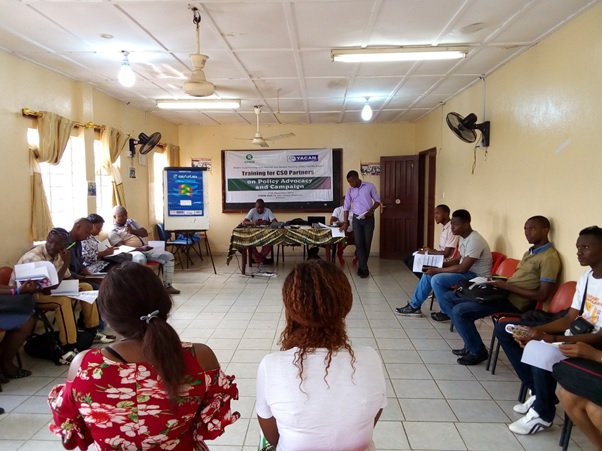By Joe Tucker
The Youth and Child Advocacy Network (YACAN) in partnership with Oxfam in the Gender Equality/SAHEL Project has, on Wednesday 11th December 2019, trained Civil Society Partners on policy, advocacy and campaign at GGEM Hall, John Street in Freetown.
Director, YACAN, Mr. Hassan Fuad Kanu, said in order for advocacy to be a continuous process, they must ensure they are able to transfer knowledge and ideas.
Mr. Kanu believes advocacy doesn’t have one suit. Giving an example that the advocacy one may use for women may be different from the one used for youth.
That is why, according to him, they had to design the training with Oxfam – their partner to look at how they can involve more youth and CSOs to better understand what is policy, advocacy and campaign which he believes has lots of similarities.
The leading consultant at the training, Mr. Kharifa K. Kamanda of YAMSA in his presentation, stated that it was ‘a give and take’ training.
He noted that if they want to look at how laws are made in a community, they must definitely have to look at what are the policies that are supporting the laws, and how they can play their own part as an organization in the field of advocacy.
CSOs from various organisations gave their views on the importance of the training.
Dennis Chukuemeka Moigbei of AID-SL, said the training was inclusive, different from other training he has attended because it was participatory and that the consultant was rich in knowledge.
David M. Mansaray of ‘Kids Wish Salone’ disclosed that the training was so important to the work they are doing, stating that he has been in the field for years and it was only during the advocacy training he was able to understand what the National Youth Policy stands for.
Olayinka W. Morgan of ‘Creole Heritage of Sierra Leone’ sees the training as an eye opener because of the skills they learnt which he believes is vital to the work they are doing.
CSOs were trained on various topics: understanding the concept of advocacy, benefits of advocacy and risks of advocacy, introducing the Community Score Card Process, Defining Public Policy, Advocacy Stakeholders and Advocacy Tools respectively
YACAN Trains CSO Partners on Policy, Advocacy and Campaign
